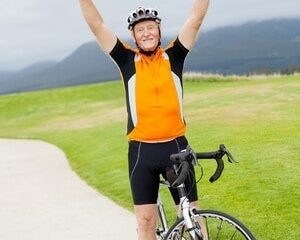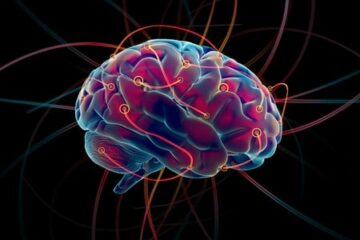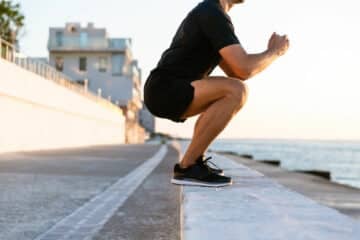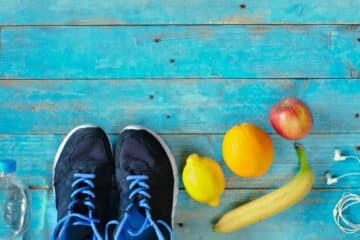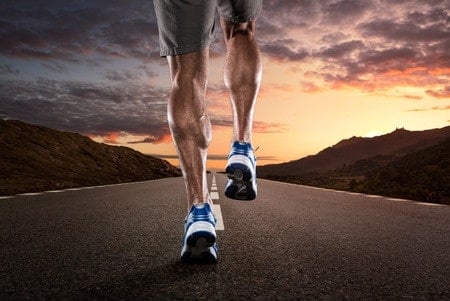
If you are like me, a treadmill is virtually a non-starter. I need to move horizontally when I exercise… and I exercise a lot. I need to run on the trails to get into that meditative state so many runners crave. But in the early summer months my training schedules change to adapt to the heat and humidity of the Northeast. Yours should too.
Running or cycling in 90 degree weather is not the same as running in 40 degree weather. Your blood volume is lower then it needs to be and other systems within your body are simply not ready to take on the heat. Unless you go through the adaptation or acclimatization process smoothly you run the risk of developing significant problems. For many runners and cyclists, properly adapting to exercising in the heat can improve their performance in more temperate conditions.
Running in the heat and humidity takes a lot more effort than running in cool crisp weather. Your VO2 max or your ability to use oxygen to create energy diminishes. You will dehydrate much quicker which not only will further diminish your VO2 max, it can create electrolyte imbalances too. Heat Exhaustion, which can lead to Heat Stroke, where your body temperature rises to dangerous temperatures is an ever-present danger and can be fatal if untreated promptly.
Sweating is the bodies way of trying to control your temperature. Under most circumstances it works very well. In high heat settings it can sometimes work to your disadvantage if you are not prepared. In very dry, or very humid conditions sweating can lead to severe dehydration.
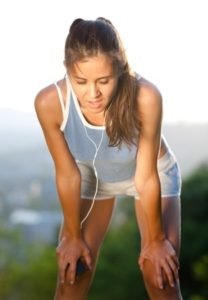
Acclimatizing to Heat
Research shows that we will acclimitize or get used to running in dry or humid high heat. In trained athletes it usually takes about 2 weeks before your body adapts. Your body will increase the volume or amount of fluid in your vessels to ready itself for exercise. This is likely due to sodium and protein retention. Many other adaptations take place. Our sweat glands become more efficient too. You will sweat more often and more efficiently. You will begin to notice that your body is getting used to exercising in the heat when your heart rate decreases despite running at the same pace. You will also notice an increase in your endurance and your VO2 max.
Just because your body might get used to running or cycling in the heat doesn’t mean that you are immune to the effects of heat exhaustion. You must be ever vigilant and be ready to respond.
Symptoms of Heat Exhaustion:
- A sudden drop in performance
- A sudden rise in your heart rate
- Dizziness
- Muscle cramps
- Vomiting
- Dry lips and mouth
IF you develop signs of heat exhaustion– stop, rest, cool down, hydrate, get home and get ready to exercise tomorrow.
Well conditioned athletes will rarely go on to develop heat stroke. Those at risk for heat stroke are young children, the elderly, poorly conditioned athletes and those of you with chronic heart disease or other illnesses. Those of you in the high risk group should not be exercising in the heat.
High Heat Exercise strategies:
- Exercise early in the morning, or later in the evening.
- Slow down, adapt, train and let your body get used to the heat.
- Consider using a heart rate monitor.
- Stay hydrated: before, during and after your exercise. During the run, drink to thirst.
- “Drinking to thirst” still leaves you dehydrated. So for long events drink more.
- Replace key electrolytes … but beware of most sports drinks. They are laden with sugar and your body can not process carbs well when exercising.
- Where loose comfortable white clothing which protects you from the sun and wicks away moisture.
- Try to find trails which are in the shade.
- Wear a hat.
- Pay attention to the warning signs of heat exhaustion !
After our bodies adapt to the stress of exercising in the heat and humidity you should be able to return to your normal training schedule. That assumes you are a healthy well trained athlete to begin with :-) If you are just starting out or your have chronic heart, lung or other illnesses you should definitely talk to your physician first.
[iframe id=”https://www.youtube.com/embed/NsHx-L5dXv4″ align=”center” autoplay=”yes”]
Stay out there… stay active… but be smart!


